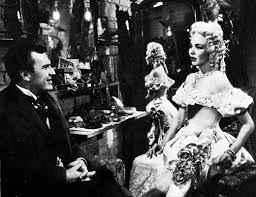Uncovering Sister Carrie's Motivation: A Journey Through Self-Determination Theory and Cognitive Evaluation The
Carrie's path to achieving self-fulfillment and success can be examined by applying two psychological frameworks, Self-Determination Theory (SDT) and Cognitive Evaluation Theory (CET). In this blog post, we will take an in-depth look at these theories and their correspondence with Carrie's driving forces and decisions.
Self-Determination Theory (SDT)
Self-Determination Theory is a psychological framework developed by Edward Deci and Richard Ryan. It posits that human beings have innate psychological needs for autonomy, competence, and relatedness, which are essential for fostering intrinsic motivation. Intrinsic motivation is the inherent desire to engage in an activity for the pleasure and satisfaction it brings, rather than for external rewards or pressures.
Intrinsic motivation is strongly linked to one's sense of autonomy, competence, and positive relationships within their environment. Let's delve into how Carrie's journey aligns with SDT.
Autonomy: Carrie's desire for independence
her desire for autonomy. Carrie's aspiration for autonomy is a key aspect of her intrinsic motivation. As she moves to Chicago and enters the world of theater and entertainment, she exercises her autonomy by making her own choices and shaping her life according to her desires.
Competence: The Growth of Carrie's Competence
Skills Competence is a crucial aspect of SDT since it involves feeling capable and effective in one's tasks. In Carrie's experience, her intrinsic motivation is driven by her evolving competence in the entertainment industry. She initially starts as a factory worker but quickly gains confidence as she becomes a successful actress and model. Her increasing competence drives her intrinsic motivation to continue pursuing her dreams.
Positive Relationships: The Role of Supportive Relationships
According to SDT, positive relationships play a crucial role in fostering intrinsic motivation.
During Carrie's journey, she encounters both supportive and unsupportive relationships. For instance, her lover Hurstwood provides her with support, thereby boosting her motivation. However, she also faces challenges from those looking to exploit her. The interaction of these relationships affects her intrinsic motivation and forces her to make choices that are consistent with her need for relatedness.
Cognitive Evaluation Theory (CET)
CET is a theory that examines how external factors such as rewards, feedback, and recognition can affect an individual's intrinsic motivation. CET states that the environment can either increase or decrease intrinsic motivation, depending on how it satisfies the psychological needs for autonomy and competence.
Perceived competence: The impact of recognition
Carrie's perception of competence is strongly influenced by external factors. As she achieves recognition and success in the entertainment industry, her intrinsic motivation is enhanced. This aligns with CET, as positive feedback and acclaim bolster her belief in her competence, driving her to pursue her career in the future.
Autonomy: The Duality of External Pressures
While autonomy is crucial to intrinsic motivation, CET acknowledges that external pressures and controls can threaten this autonomy. Carrie's interactions with agents, managers, and the expectations of the entertainment industry occasionally threaten her autonomy. Still, her ability to deal with these challenges and maintain some control over her career shows her resilience in maintaining her intrinsic motivation.
Positive relationships: The impact of supportive people
CET points out the role of external feedback and relationships in shaping intrinsic motivation. Carrie's relations with Hurstwood and industry supporters positively impact her motivation. They encourage and validate her pursuit of goals, aligning with CET's belief that positive relationships can enhance intrinsic motivation.
Conclusion
In Sister Carrie's world, we can analyze her motivation through the perspectives of Self-Determination Theory and Cognitive Evaluation Theory. Her motivation is driven by her need for autonomy, competence, and positive relationships, which are essential aspects of SDT. The external pressures and rewards she experiences in her life also play a role in shaping her intrinsic motivation, which is consistent with CET.


Once again, you provide a thorough description of the theory and an analysis of Carrie's motivation. I can see how her motivation was supported by CET!
ReplyDelete